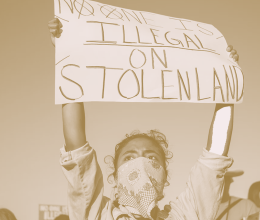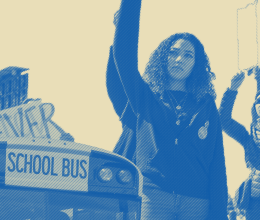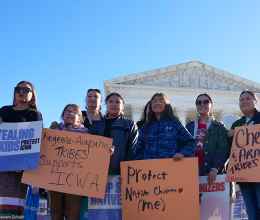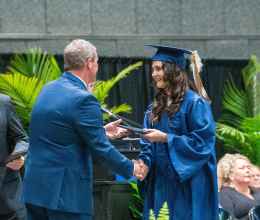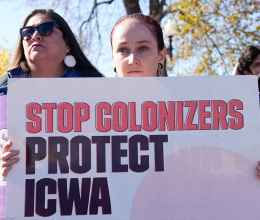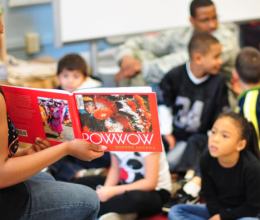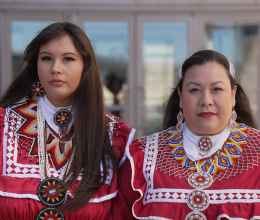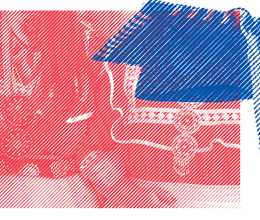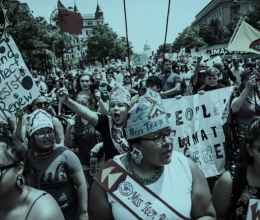
Every year on Thanksgiving Day, people across the country gather with loved ones to share a special meal. This breaking-of-bread-style holiday is a well-known ritual, but for many of us, continuing to participate in Thanksgiving with integrity means breaking with traditions that rely on fictionalized accounts of history. Here are some tips for moving beyond outdated narratives of kind-hearted pilgrims and one-dimensional Native Americans towards a more authentic and respectful approach to giving thanks.
1. Make space during your holiday celebration to acknowledge that all land in the United States is Indigenous land.
Start by acknowledging the land beneath you. All land in the United States is Indigenous land. To find out whose land you are on, visit https://native-land.ca/. The ACLU of Wyoming recognizes that it exists on occupied territory; see our land acknowledgment here.
2. Challenge the false and harmful Thanksgiving origin story.
The arrival of European settlers led to the displacement and decimation of Indigenous populations through disease, forced relocation, and outright genocide—a reality that exists in sharp contrast to the romanticized story of an amicable feast between “pilgrims and Indians.” Be critical of Thanksgiving stories that flatten the rich cultural diversity of Indigenous people and reduce them to background characters in colonial history.
3. Counter the narrative that Native people exist in the past and clearly establish links between history and the ongoing impacts of settler colonialism.
Settler colonialism involves the systematic removal, assimilation, and eradication of Indigenous cultures, languages, and people, with the deliberate aim of supplanting them with an invasive settler society. This form of colonialism is not just a historical event but an ongoing process that continues to negatively affect Indigenous communities today. One of the many issues with the Thanksgiving myth is that it creates a false sense of historical closure by portraying Indigenous people and Tribes as existing in the past. Indigenous people are still here, and they are actively shaping their own futures. Be clear that settler colonial violence is ongoing and call out contemporary issues Indigenous communities face, such as land theft, threats to sacred sites, discrimination in education and child welfare systems, bias in the criminal legal system, and attacks on tribal sovereignty, among others.
4. Consider what foods on your table are Indigenous and learn about Indigenous food systems.
Many foods prepared for Thanksgiving are Indigenous foods: squash, corn, beans, pumpkins, and more. When Native people were violently removed from their land by white settlers, many Indigenous food traditions were lost. The forced displacement of Indigenous peoples was (and still is) a deliberate attempt to sever Indigenous people from their traditional ways of living, including food production and ceremony. However, many Indigenous-led movements are actively working to restore ancestral food practices. Native American people around the country have been reclaiming traditional foods, decolonizing their diets, and relearning how to use food as medicine to keep cultural food practices alive for generations to come.
5. Actively affirm that anti-racism and decolonization work is the responsibility of everyone not only during Thanksgiving, but always.
Dismantling harmful rhetoric about Thanksgiving and Native American history is the work of everyone. Be a vocal proponent for an inclusive and accurate portrayal of history in school curricula. Support Indigenous-led movements in their efforts to restore land rights, preserve tribal sovereignty, and protect sacred sites. Educate yourself and others about Indigenous cultures and histories, and seek out literature, movies, and events that elevate Indigenous voices and experiences.
To learn more about Indigenous history and how to further decolonize your Thanksgiving, please check out these resources:
- Democracy Now! Interview with Historian Roxanne Dunbar-Ortiz on Thanksgiving
- Book Excerpt: The Real Thanksgiving by Roxanne Dunbar-Ortiz and Dina Gilio-Whitaker
- An Indigenous Peoples’ History of the United States by Roxanne Dunbar-Ortiz
- Decolonizing Thanksgiving by Crystal Pardue
- North American Traditional Indigenous Food Systems
- Decolonizing Thanksgiving and Reviving Indigenous Relationships to Food by M. Karlos Baca
- 2022 Rethinking Thanksgiving Toolkit by Indigenous Solidarity Network
- Decolonizing Thanksgiving: A Toolkit for Combatting Racism in Schools by Lindsey Passenger Wieck
